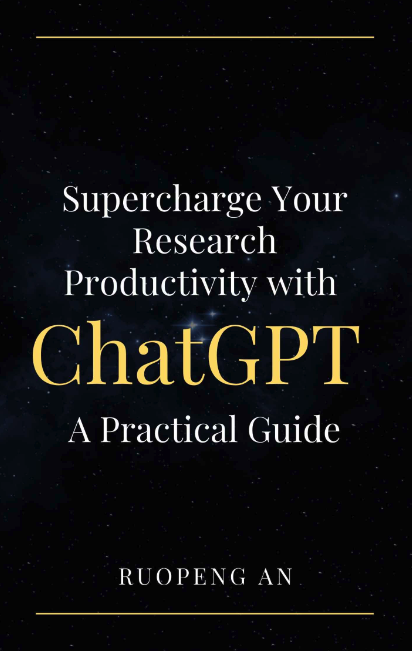Artificial intelligence (AI) can turn from a mere tool into a full-fledged partner in the research process. A new book from a faculty member at the Brown School at Washington University in St. Louis serves as a guide to the future of research.
“As I see it, ChatGPT and other AI technologies are poised to revolutionize the landscape of research in ways we are only beginning to appreciate,” said Ruopeng An, an associate professor, who teaches applied machine and deep learning courses and is chair of the artificial intelligence and big data analytics for public health certificate program.

He is the author of “Supercharge Your Research Productivity with ChatGPT: A Practical Guide,” released May 21.
“If harnessed correctly, we’re looking at a future where AI not only assists with data collection, analysis and presentation, but also proactively contributes to the conceptualization, refinement and testing of our hypotheses,” An said. “In a nutshell, we as researchers have to quickly adapt to the new norm of human-machine partnership.”
AI is not a magical solution to all research challenges, nor is it an ominous threat to our intellectual autonomy, An argued.
“What it is, though, is a powerful catalyst,” he said. “It has the potential to enhance our research capabilities and broaden our intellectual horizons. It’s a tool that demands understanding, respect and thoughtful utilization. When we embrace AI with the spirit of collaboration and balanced skepticism, the rewards can be immense.”
An has started using AI in his own public health research and said the results have been transformative.

“The immediate, obvious gain is in terms of productivity; we’ve observed an increase ranging from 50% to 100%, which is a staggering margin in the world of research,” he said. “But beyond the numbers, there’s a subtler, more profound advantage. ChatGPT serves as a sounding board, a collaborator that doesn’t tire, doesn’t get distracted or disoriented, and constantly challenges our assumptions.
“It has helped in refining our hypotheses, conducting exhaustive literature reviews and even performing qualitative data analysis. It’s like having an additional team that’s always ready to contribute, pushing us to be more creative, meticulous and bold in our research endeavors.”
Using nearly 100 tangible, real-world research examples, the book presents a detailed pathway for how researchers, regardless of their area of study, can employ ChatGPT as a competent research assistant.
The guide encapsulates 10 principles to accomplish a vast array of research tasks:
- Identifying research topics and framing questions through an in-depth discussion with ChatGPT
- Formulating and refining hypotheses based on the chosen research question
- Undertaking literature reviews, covering all steps of a systematic review protocol
- Selecting adequate research design and corresponding methodology
- Developing valid, reliable and efficient research tools
- Handling every aspect of data collection, management and ethics
- Interpreting and analyzing both quantitative and qualitative data
- Writing and refining research papers and reports
- Addressing peer review comments
- Disseminating study findings through mass and social media platforms.
“The future is here, and it’s time we reshape our understanding of what research can be,” An said. “My book is a humble attempt to guide researchers through this transformative journey. It’s a new era of human-machine partnership in research, and I’m thrilled to be part of it.”


